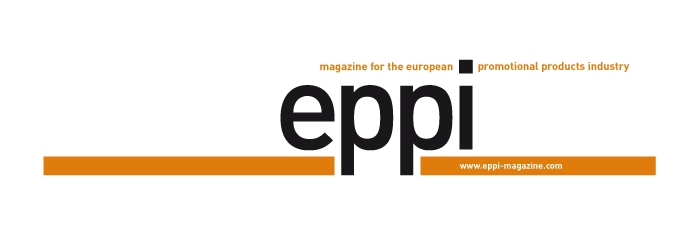Halfar has made a name for itself on the promotional products market with high-quality bags and rucksacks. eppi magazine met up with the Managing Directors, Armin Halfar and Kathrin Stühmeyer-Halfar, and the Marketing Director, Simone Rath at the company’s head office in East Westphalia to gain an insight into the business and the philosophy of the bag specialists.
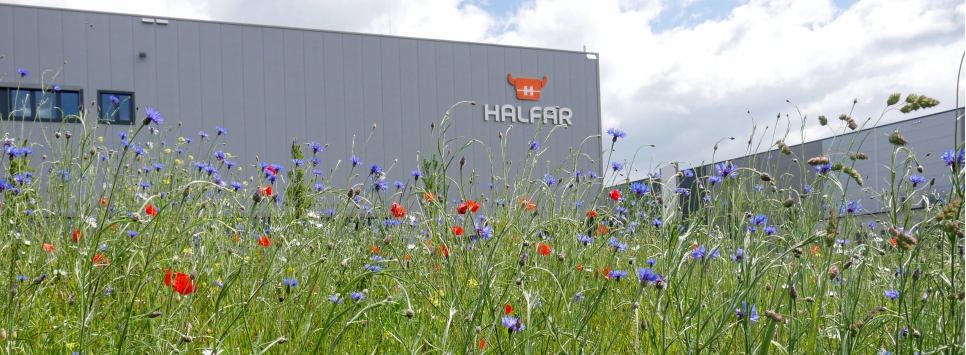
It spreads its wings, flies around a sewing machine and up to the heavens. The creature on the old tin plate is the mythical bird, the phoenix, which the Bielefeld-based machine builder, Baer & Rempel, used as the logo and brand name for its sewing machines. This and other advertising plates made of tin and enamel cover the wall of the long main corridor at Halfar’s headquarters in Bielefeld-Oldentrup.
“Bielefeld was a centre of the sewing machine industry. Dürkopp, Adler, Anker, Phoenix all come from here,” explained Armin Halfar, founder of the bag manufacturer. He has been passionately collecting these advertising signs for sewing machines from the 20th century for years. Not only brands from Bielefeld, but also the signs of Singer, Pfaff and Titan decorate Halfar’s head office. The entrepreneur recounted how he had snapped up battered signs at flea markets and had them restored and purchased others for a lot of money at auctions. The plates which also make historical marketing strategies of brand companies like Singer visible are more than just decoration. They are the visualisation of the history of a once thriving branch of industry, Bielefeld’s textile and sewing machine industry, which also attracted Halfar’s ancestors to the East Westphalian metropolis many years ago.
Armin Halfar already learnt how to sew on his grandmother’s Phoenix sewing machine as a young lad and thanks to this skill already designed his own medic bag while doing his civilian service as a paramedic in 1988. The bag proved to be so practical that the demand among his colleagues quickly turned the idea into a business model. Halfar registered his business. An old Phoenix sewing machine like the one his grandma had is still on show at the company’s premises symbolising the founding of the company.
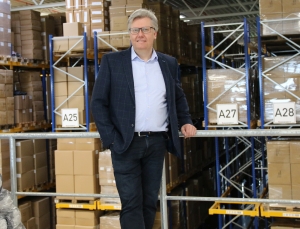
Armin Halfar in front of the new, external warehouse which was built in 2019. It has 11,000 pallet storage places and room for millions of bags.
Armin Halfar no longer sews alone at home on an antique sewing machine. In the meantime, the headcount in Bielefeld has increased up to 129 employees and the sample sewing shop is equipped with ultra-modern special sewing machines. Today, the company is one of the leading European specialists in the promotional bag segment and is considered to be a flagship company with a broad selection of items, good availability and a clear alignment for the future.
Quality and know-how as the basis
“New things are based on old things. Experience and expertise produce a stability that change can build on,” said Simone Rath, the Marketing Director, who has been with the company for just under two decades. This sums up the development of her employer in a nutshell.
Custom-made designs for special purposes, transport and tool bags were where it all started. Since this segment requires high demands in the functionality of the design and in the durability of the material, well-founded knowledge and passion for the product was necessary in order to assert oneself on the market. The company still breathes passion for bags through every single pore today. “We enjoy developing beautiful, functional models and launching them onto the market,” confirmed Kathrin Stühmeyer-Halfar, who runs the company jointly together with her husband, Armin.
The fact that the name Halfar stands for highquality products is expressed by the company’s motto – “Strong bags”. The logo over the slogan shows a bag, the straps of which remind one of the horns of a Viking helmet – a tongue-in-cheek reference to the Norwegian origin of the name Halfar.
When it entered the promotional bag segment in the year 2000 after exhibiting at the PSI Show in Düsseldorf, the company also gained popularity points with its self-declared claim to stability and good quality. In the meantime, the promotional products sector accounts for approx. 60% of the company’s turnover. Customised bags and rucksacks from Bielefeld are sold all over Europe.
Global change of perspective
Today, the goods are being produced in Europe more and more often again, i.e. in Romania. Diverse Halfar designs are produced there using Halfar’s machines and know-how in a factory that exclusively manufacturers items for Halfar – in addition to special bags, for example the aptly named Europe series, comprising of notebook bags, rucksacks and travel bags made from rPET, as well as the modular LorryBag that can be individualised to suit the customers’ needs.
Parts of the material and pre-fabricated components are still provided by suppliers from the Far East, where the majority of the promotional bags collection are also sewn together. The established business relations have ensured that Halfar survived the pandemic well, even when it wasn’t possible to physically travel to the factories. As well as its excellent knowledge of the Far Eastern market, Halfar also profits from the resources of the Choice Group.
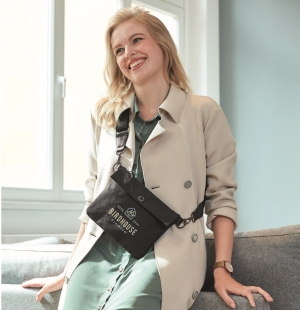
The cotton series Life convinces with its cool look.
Six promotional products suppliers joined forces to form the Choice Group under the umbrella of JCK-Holding, which has been a share holder of Halfar since 2003. The remaining subsidiaries are Daiber, Fare, Karlowsky, mbw and SND. They can fall back on the joint infrastructure for quality assurance audits in the Far East, sourcing or the group’s own testing laboratory. The knowledge transfer within the group and joint trade fair presences bring the individual companies advantages regarding their respective market positions. All of this helps on the one hand to master the growing demands of the everyday business and on the other hand to recognise market trends at an early stage and align one’s own business accordingly. This includes, last but not least, the further promotion of cooperations with European production partners.
“We are receiving more and more enquiries for goods that are not manufactured in the Far East,” ascertained Armin Halfar. He not only sees the dependence on Asiatic suppliers as being problematic for geopolitical reasons. He is of the opinion that the production in Europe is more sustainable too, because the shorter transport routes reduce the fuel consumption. Furthermore, the orders can be delivered faster and more reliably. In this way, the company is accommodating the needs of the market. In times of global supply chain bottlenecks, Halfar wants to be in a position to react to orders fast and ensure reliable deliveries. “We have a competitive edge due to our flexibility and the ability to deliver in spite of the higher labour costs in Europe,” stated Halfar.
To ensure being capable of supplying goods, the company has expanded its warehouse and logistics capacities over the past years. A new logistic centre including a high-bay warehouse with over 11,000 pallet storage places for millions of bags and rucksacks was built in Bielefeld’s Altenhagen industrial park in 2019. Countless rolls of materials with tens of thousands of metres of fabric in a wide variety of colours and materials are also stacked up here. Warehouse employees busily manoeuvre their forklift trucks through the rows of shelves to store incoming goods in the right place or move the picked batch to the dispatch department where they are then shipped by lorry – whether it is the 1,800 km to the production site in Romania or the eight kilometres to be customised in Oldentrup.
The ability to deliver is also a reason why the capacities at the actual head office in Bielefeld-Oldentrup have been continually expanded. As well as the development, concept and dispatch departments, the sampling division is also located here. The large materials warehouse ensures that the samples sewing shop is equipped for three quarters of a year and that prototypes as well as smaller batches of special bags can continue to be produced. All customising methods such as transfer or digital printing, laminating and embroidery can be carried out in Bielefeld.
The non-profit-making company, Prosigno GmbH, which integrates people with disabilities into the job market via an inclusion concept of the Lebenshilfe Bielefeld, is responsible for the screen printing. Armin Halfar is a shareholder of Prosigno and his company leases part of the premises at the location in Oldentrup to the firm, which takes care of most of the orders for promotional bags that are screen printed. Since the company is located at the same premises no transport costs are incurred.
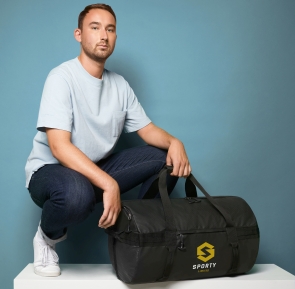
Halfar won a Promotional Gift Award 2023 for the Active series that is made out of PVC-free canvas.
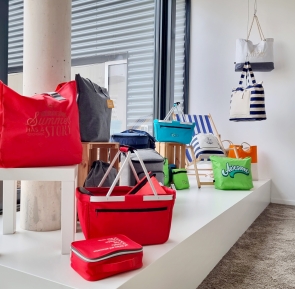
Beautiful bags stylishly arranged in the spacious showroom.
Its customising expertise turns Halfar into a highly-appraised supplier and partner for the promotional products trade, even in cases where the company doesn’t imprint or embroider the bags and rucksacks itself. All of the promotional bags are designed from the onset to carry a logo. “The embellishers love us because we speak their language,” noted Armin Halfar.
Responsibility for mankind and the environment
The cooperation with the support programme of Prosigno reflects Halfar’s general corporate philosophy. Social and ecological matters are key issues that the company addresses in many ways. Halfar has been cooperating with the workshops of the aid programme for 20 years, Prosigno was founded in 2012. Halfar strives to normalise dealing with disabilities and promote the interaction between people with and without disabilities.
The New Work approach that is lived within the company relies on appreciative management, communications and transparency in all business areas. Via a rotation system employees can gain an insight into other departments and thus understand their demands and necessities more readily. Light, open and ergonomically designed workplaces with height-adjustable desks and floor mats that are easy on the joints when working in a standing position promote employee health. Family-friendly working time regulations ensure a good work-life balance and satisfied staff. The company profits from this positive working climate and employee bonding in times of a lack in skilled workers.
Halfar also continually works on ecological improvements. Flowers planted on the company’s premises offer insects a habitat and thus enrich the biodiversity of the flora and fauna. Wild bees, birds and moles romp around in between the wild flowers that have long since replaced the lawns. The theme of insects is a matter close to Armin Halfar’s heart. A Halfar special edition of the book Warum jede Fliege zählt (Why every fly counts) by Hans-Dietrich Reckhaus, which he gave to all of the employees and customers as a Christmas present and which was also distributed at Halfar’s stand at the PSI Show in Düsseldorf in January 2023, is proof of his passionate explanatory work.
In terms of energy consumption, thanks to a photovoltaic system, green electricity and wood pellets Halfar has been CO2 neutral since 2022. The company is EcoVadis certified and also the materials for the production comply with diverse seals of ecological and social standards such as Fairtrade, Oeko-Tex, the Global Organic Textile Standard (GOTS) and the Global Recycled Standard (GRS). An in-house repair service is offered for all bags, should a seam tear or a fastener break. This extends the service life and in turn the sustainability of the products. “We have always offered this service,” the Marketing Director, Rath, stated. “But it has gained a new significance in an age when it is important to make one’s resource-saving efforts visible on the market. All of a sudden, everyone thinks it is something new.” Armin Halfar added: “Reusing and repairing things are actually very old concepts. That is what the past generations used to do. Our throw-away society forgot all about these processes and is now rediscovering them. Practising sustainability isn’t that difficult, if one takes heed of how our grandparents used to live: Don’t waste anything, pay attention to long service lives and reuse all materials as expediently as possible.” He considers that his company is obliged to show this ethical commitment.
All measures in all business areas strictly comply with the sustainable development goals of the United Nations. Accordingly, Halfar was distinguished as “Sustainable Company of the Year” by the PSI in the years 2021 and 2022.
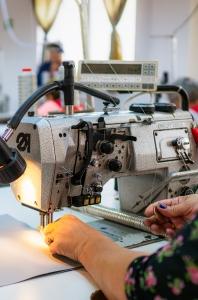
The Europe bag series is sewn together in Romania.
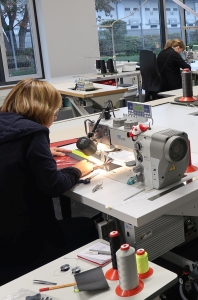
Ultra-modern, special Dürkopp Adler sewing machines are implemented in the samples sewing shop.
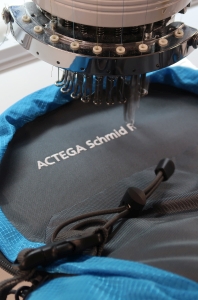
A rucksack being embroidered.
The fact that a long shelf and service life of the products are a decisive criterion for sustainability, doesn’t however mean that attention is only paid to the ecological compatibility of the material and production methods. The Managing Director, Kathrin Stühmeyer-Halfar, explained, “Our bags have to be just as good as the ones people buy in retail shops.” The promotional bags only fulfil their purpose as sustainable promotional products if they convince and are actually implemented long-term in the everyday routine. Hence, according to Stühmeyer-Halfar, the visual appearance is very important, after all bags are fashion statements and the decision-makers often base their choices on their own taste criteria. Simple pouches and carrier bags for the supermarket and shopping tour, travel trolleys for the next business trip, elegant laptop sleeves, sporty bicycle rucksacks, belt pouches or writing cases: All of these and more are available in a wide range of shapes, colours and materials. The breadth and depth of the line-up leaves almost no wishes unfulfilled and should the collection not include the desired product, for a certain volume upwards it can be individually designed on request.
Two in-house product designers create new designs for the standard collection in line with the respective specifications for the material, functionality, aesthetics and suitability for storage. The process from the idea to the finished product takes approx. four months, before the bag or rucksack can start being produced.
Halfar reacts to long-term trends, it doesn’t want to let itself be flashed by every latest fashion hype. Some of the products have been part of the line-up for years, which pleases many of the regular customers, who keep on opting for the same model. The novelties are becoming increasingly more minimalist, as Armin Halfar explained, “Where we can do without superfluous frills, we save the material and thus resources.” Plain colours, simple and classic shapes display a fashionable timelessness that ensures the bags from Bielefeld a longer service life. The promoting companies thus benefit from an extended promotional impact, which is indeed the underlying purpose.
Corporate responsibility for the future
With extensive product understanding and commitment to the highest quality that results from the company’s history as a supplier of special bags, today Halfar finds itself in a good position in this present age when the principle “quality instead of quantity” is asserting itself more and more, also on the promotional products market. Instead of distributing countless cheap giveaways, companies are increasingly attempting to implement higher quality products. In Armin Halfar’s opinion, “The market has changed. For example, the need for event bags has strongly declined and it won’t return to the pre-pandemic level either.” Halfar welcomes this trend towards fewer but better products and he demands a certain appreciation for high-quality and useful products.
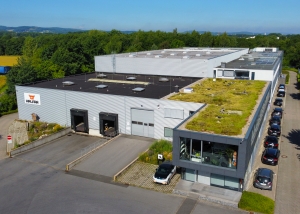
A green area decorates the roof of the company’s headquarters in Bielefeld-Oldentrup.
“If customers in a furniture store can buy a large, robust bag made of blue, PP fabric at the checkout for just one Euro and think that is the regular price for such a product, a totally false impression of the actual costs arises,” Armin Halfar pointed out. Here, he doesn’t just mean the fact that a furniture chain is selling these bags under cost price for marketing purposes, but also the prevailing price pressure within the textile industry in general. The low appreciation of textile products goes hand in hand with a massive exploitation of workers and damage to the environment. Armin Halfar doesn’t want to submit to this logic. “As an entrepreneur one has to live in the future,” he explained.
However, what sounds like a phrase out of a manager’s manual, means much more to the entrepreneur from Bielefeld than appraising the expected turnover for the coming quarter, anticipating new developments or the next investment into further growth. For Halfar this also means taking over responsibility for the future of the world and society. Halfar intends to further pursue and improve this philosophy. Stühmeyer-Halfar summarises the creed as follows: “We want to sell good, sustainable bags to good customers and offer all employees a good environment.”
Less than two kilometres away from Halfar’s head office, one can drive passed the current location of the last remaining sewing machine company in Bielefeld, Dürkopp Adler. This is where Halfar sources its machines. The brands Phoenix and Anker are long gone. In spite of the industrial structural change, Halfar is proving that a company can survive on the market with highquality products and a clear vision and that the heart of the East Westphalian textile industry is still beating.
// Andreas J. Haller
photos: Andreas J. Haller © WA Media GmbH / Halfar




